Unit 09: Entrepreneurship and Small Business Management Report - HND
VerifiedAdded on 2023/01/18
|16
|4628
|93
Report
AI Summary
This report delves into the multifaceted world of entrepreneurship and small business management, examining different types of entrepreneurial ventures such as high-growth firms, managed-growth firms, and survival-growth firms, along with their respective typologies. It also explores the similarities and differences between these ventures. The report analyzes the impact of micro and small businesses on the economy, providing relevant data and statistics, while also highlighting the importance of small businesses and start-ups in fostering social economic growth. Furthermore, it investigates the characteristic traits and skills that distinguish successful entrepreneurs from other business managers, assessing how entrepreneurial personalities reflect motivation and mindset. Finally, the report considers the impact of background and experience on entrepreneurship, using Richard Branson as a case study, and concludes with a comprehensive overview of the key findings.
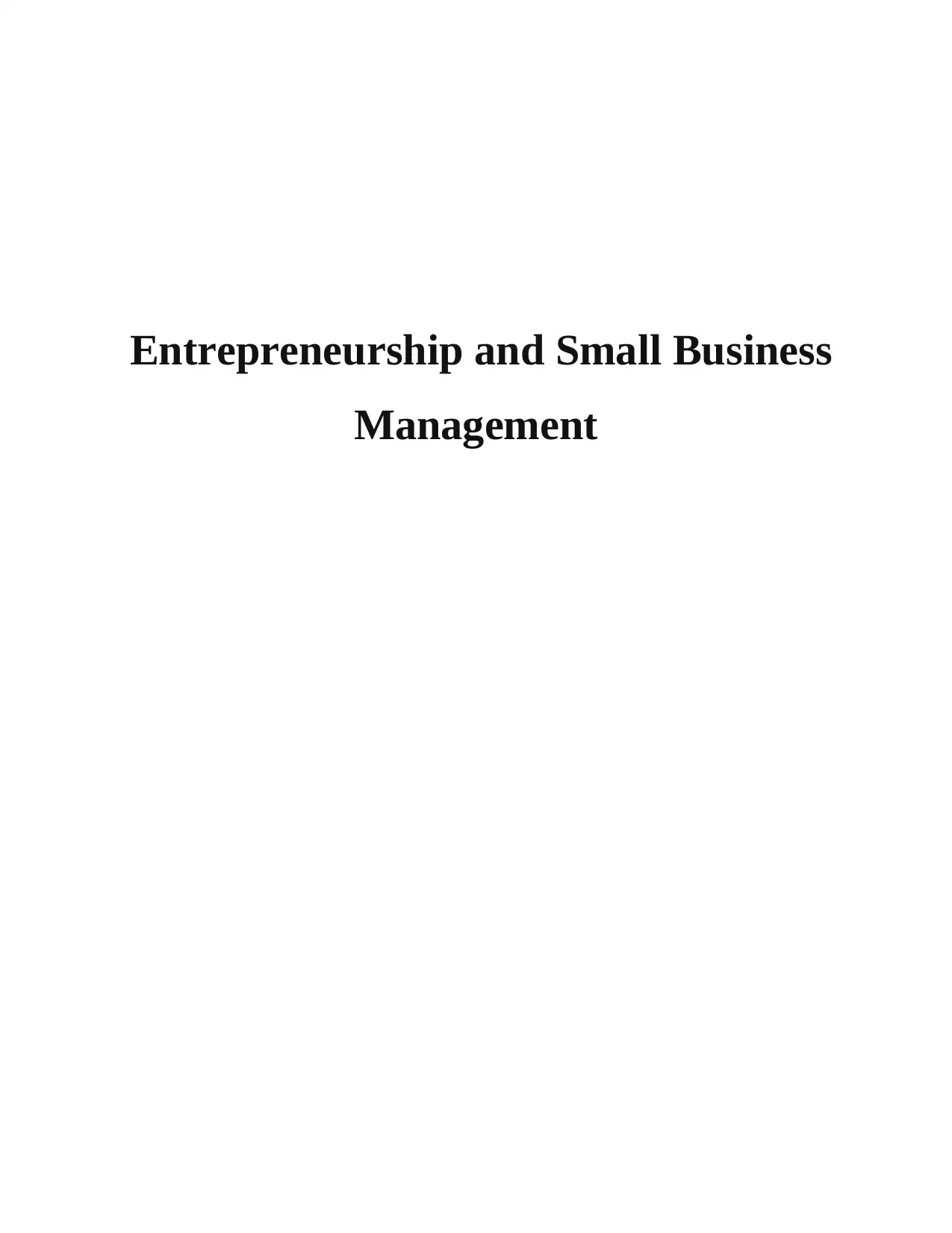
Entrepreneurship and Small Business
Management
Management
Paraphrase This Document
Need a fresh take? Get an instant paraphrase of this document with our AI Paraphraser
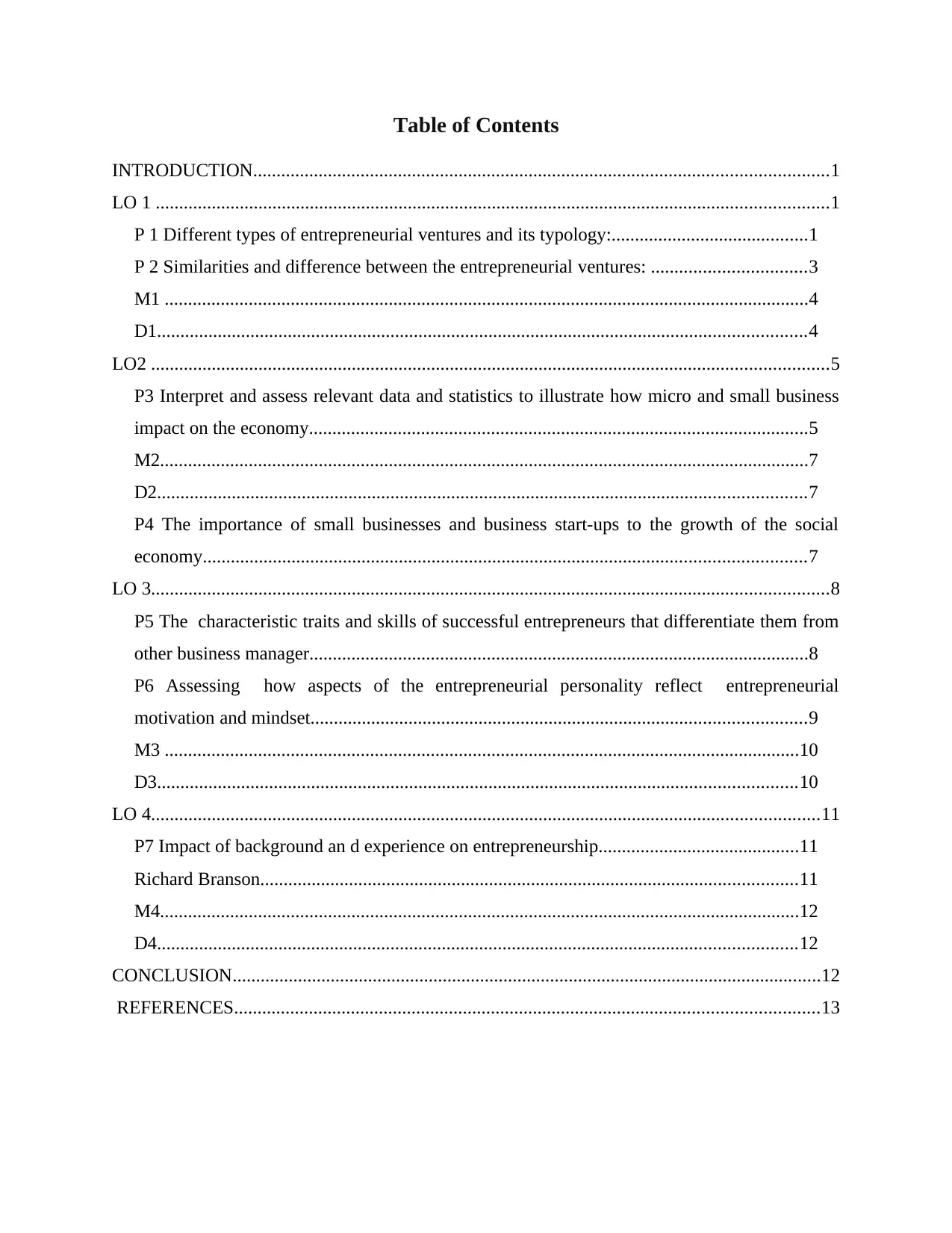
Table of Contents
INTRODUCTION...........................................................................................................................1
LO 1 ................................................................................................................................................1
P 1 Different types of entrepreneurial ventures and its typology:..........................................1
P 2 Similarities and difference between the entrepreneurial ventures: .................................3
M1 ..........................................................................................................................................4
D1...........................................................................................................................................4
LO2 .................................................................................................................................................5
P3 Interpret and assess relevant data and statistics to illustrate how micro and small business
impact on the economy...........................................................................................................5
M2...........................................................................................................................................7
D2...........................................................................................................................................7
P4 The importance of small businesses and business start-ups to the growth of the social
economy.................................................................................................................................7
LO 3.................................................................................................................................................8
P5 The characteristic traits and skills of successful entrepreneurs that differentiate them from
other business manager...........................................................................................................8
P6 Assessing how aspects of the entrepreneurial personality reflect entrepreneurial
motivation and mindset..........................................................................................................9
M3 ........................................................................................................................................10
D3.........................................................................................................................................10
LO 4...............................................................................................................................................11
P7 Impact of background an d experience on entrepreneurship...........................................11
Richard Branson...................................................................................................................11
M4.........................................................................................................................................12
D4.........................................................................................................................................12
CONCLUSION..............................................................................................................................12
REFERENCES.............................................................................................................................13
INTRODUCTION...........................................................................................................................1
LO 1 ................................................................................................................................................1
P 1 Different types of entrepreneurial ventures and its typology:..........................................1
P 2 Similarities and difference between the entrepreneurial ventures: .................................3
M1 ..........................................................................................................................................4
D1...........................................................................................................................................4
LO2 .................................................................................................................................................5
P3 Interpret and assess relevant data and statistics to illustrate how micro and small business
impact on the economy...........................................................................................................5
M2...........................................................................................................................................7
D2...........................................................................................................................................7
P4 The importance of small businesses and business start-ups to the growth of the social
economy.................................................................................................................................7
LO 3.................................................................................................................................................8
P5 The characteristic traits and skills of successful entrepreneurs that differentiate them from
other business manager...........................................................................................................8
P6 Assessing how aspects of the entrepreneurial personality reflect entrepreneurial
motivation and mindset..........................................................................................................9
M3 ........................................................................................................................................10
D3.........................................................................................................................................10
LO 4...............................................................................................................................................11
P7 Impact of background an d experience on entrepreneurship...........................................11
Richard Branson...................................................................................................................11
M4.........................................................................................................................................12
D4.........................................................................................................................................12
CONCLUSION..............................................................................................................................12
REFERENCES.............................................................................................................................13
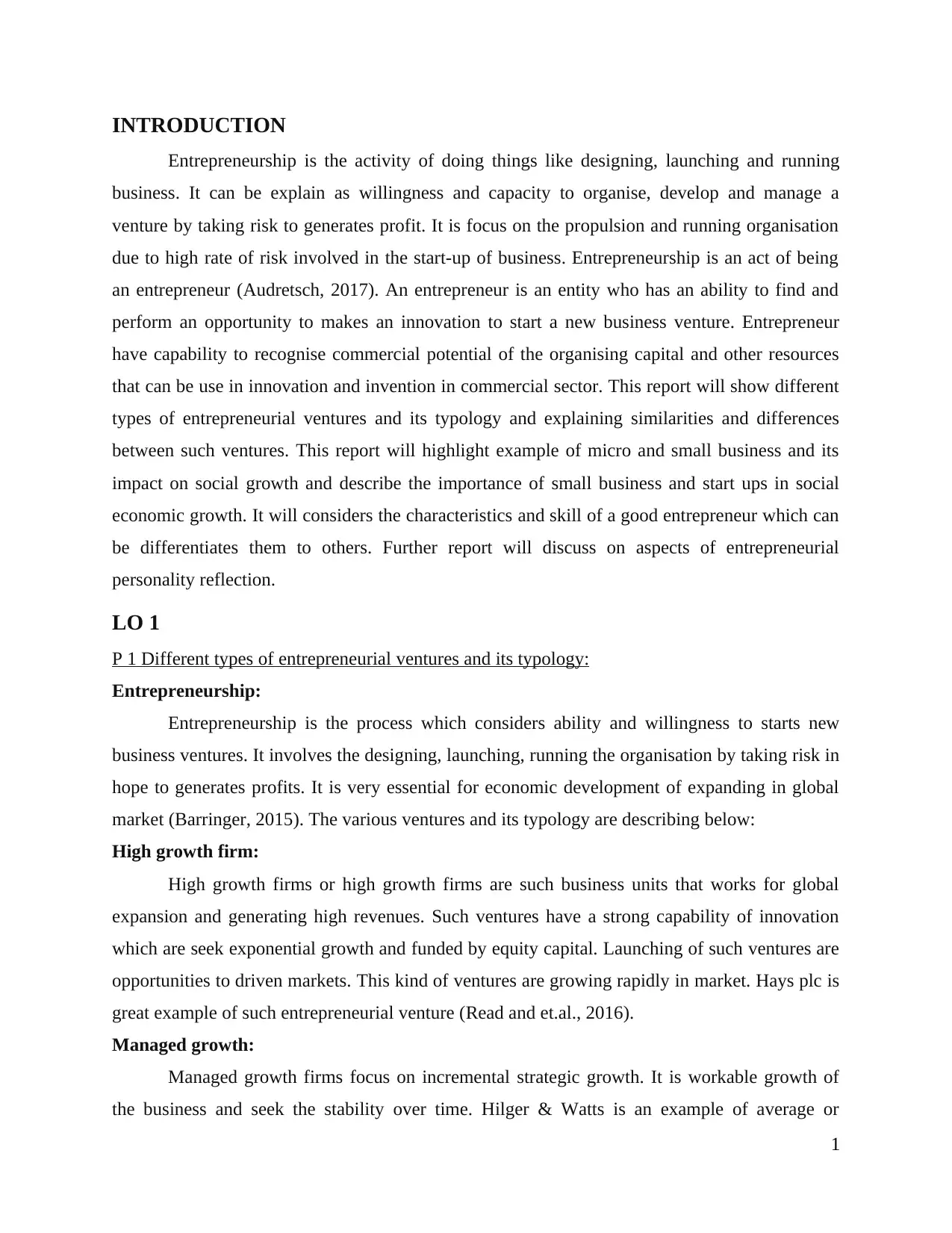
INTRODUCTION
Entrepreneurship is the activity of doing things like designing, launching and running
business. It can be explain as willingness and capacity to organise, develop and manage a
venture by taking risk to generates profit. It is focus on the propulsion and running organisation
due to high rate of risk involved in the start-up of business. Entrepreneurship is an act of being
an entrepreneur (Audretsch, 2017). An entrepreneur is an entity who has an ability to find and
perform an opportunity to makes an innovation to start a new business venture. Entrepreneur
have capability to recognise commercial potential of the organising capital and other resources
that can be use in innovation and invention in commercial sector. This report will show different
types of entrepreneurial ventures and its typology and explaining similarities and differences
between such ventures. This report will highlight example of micro and small business and its
impact on social growth and describe the importance of small business and start ups in social
economic growth. It will considers the characteristics and skill of a good entrepreneur which can
be differentiates them to others. Further report will discuss on aspects of entrepreneurial
personality reflection.
LO 1
P 1 Different types of entrepreneurial ventures and its typology:
Entrepreneurship:
Entrepreneurship is the process which considers ability and willingness to starts new
business ventures. It involves the designing, launching, running the organisation by taking risk in
hope to generates profits. It is very essential for economic development of expanding in global
market (Barringer, 2015). The various ventures and its typology are describing below:
High growth firm:
High growth firms or high growth firms are such business units that works for global
expansion and generating high revenues. Such ventures have a strong capability of innovation
which are seek exponential growth and funded by equity capital. Launching of such ventures are
opportunities to driven markets. This kind of ventures are growing rapidly in market. Hays plc is
great example of such entrepreneurial venture (Read and et.al., 2016).
Managed growth:
Managed growth firms focus on incremental strategic growth. It is workable growth of
the business and seek the stability over time. Hilger & Watts is an example of average or
1
Entrepreneurship is the activity of doing things like designing, launching and running
business. It can be explain as willingness and capacity to organise, develop and manage a
venture by taking risk to generates profit. It is focus on the propulsion and running organisation
due to high rate of risk involved in the start-up of business. Entrepreneurship is an act of being
an entrepreneur (Audretsch, 2017). An entrepreneur is an entity who has an ability to find and
perform an opportunity to makes an innovation to start a new business venture. Entrepreneur
have capability to recognise commercial potential of the organising capital and other resources
that can be use in innovation and invention in commercial sector. This report will show different
types of entrepreneurial ventures and its typology and explaining similarities and differences
between such ventures. This report will highlight example of micro and small business and its
impact on social growth and describe the importance of small business and start ups in social
economic growth. It will considers the characteristics and skill of a good entrepreneur which can
be differentiates them to others. Further report will discuss on aspects of entrepreneurial
personality reflection.
LO 1
P 1 Different types of entrepreneurial ventures and its typology:
Entrepreneurship:
Entrepreneurship is the process which considers ability and willingness to starts new
business ventures. It involves the designing, launching, running the organisation by taking risk in
hope to generates profits. It is very essential for economic development of expanding in global
market (Barringer, 2015). The various ventures and its typology are describing below:
High growth firm:
High growth firms or high growth firms are such business units that works for global
expansion and generating high revenues. Such ventures have a strong capability of innovation
which are seek exponential growth and funded by equity capital. Launching of such ventures are
opportunities to driven markets. This kind of ventures are growing rapidly in market. Hays plc is
great example of such entrepreneurial venture (Read and et.al., 2016).
Managed growth:
Managed growth firms focus on incremental strategic growth. It is workable growth of
the business and seek the stability over time. Hilger & Watts is an example of average or
1
⊘ This is a preview!⊘
Do you want full access?
Subscribe today to unlock all pages.

Trusted by 1+ million students worldwide
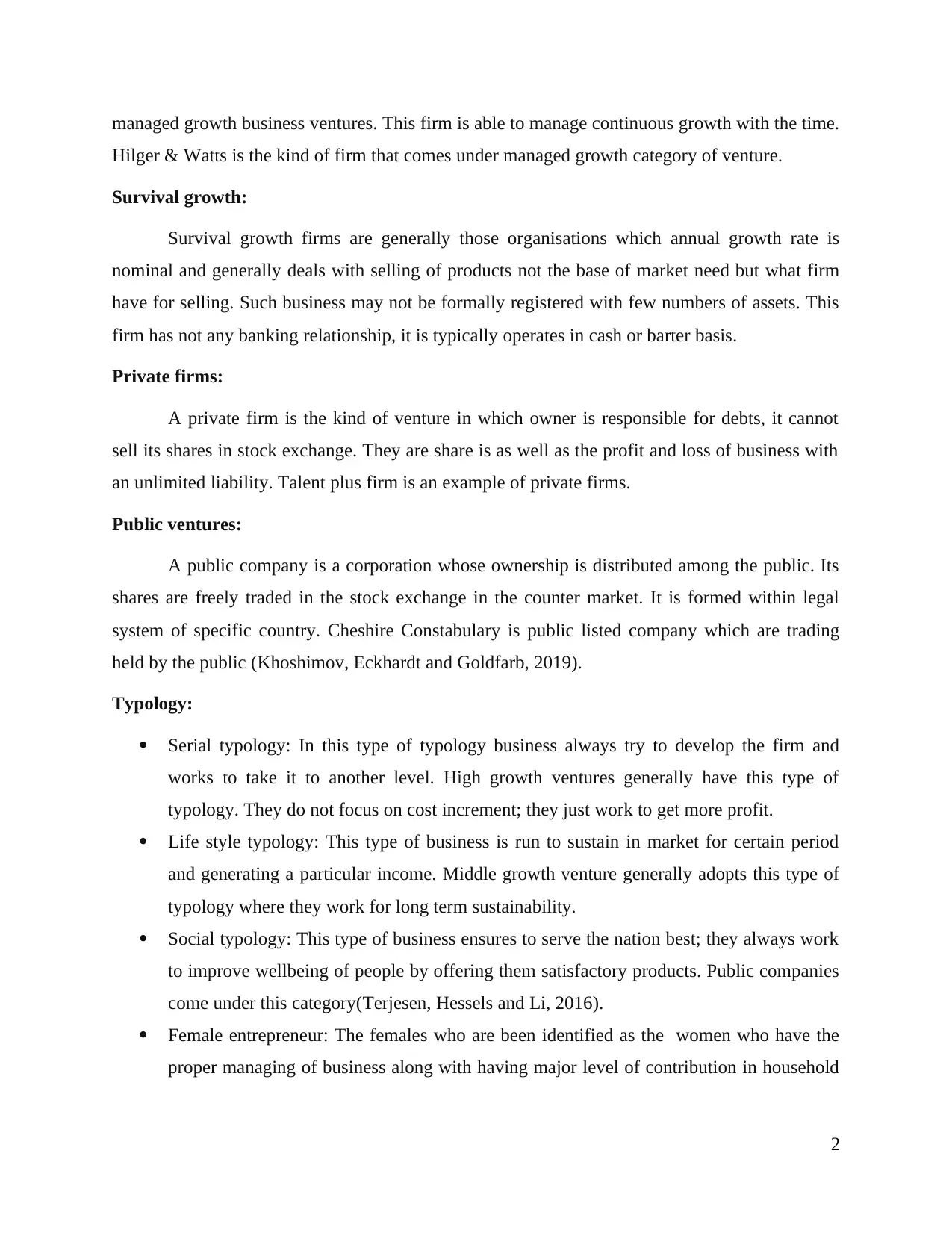
managed growth business ventures. This firm is able to manage continuous growth with the time.
Hilger & Watts is the kind of firm that comes under managed growth category of venture.
Survival growth:
Survival growth firms are generally those organisations which annual growth rate is
nominal and generally deals with selling of products not the base of market need but what firm
have for selling. Such business may not be formally registered with few numbers of assets. This
firm has not any banking relationship, it is typically operates in cash or barter basis.
Private firms:
A private firm is the kind of venture in which owner is responsible for debts, it cannot
sell its shares in stock exchange. They are share is as well as the profit and loss of business with
an unlimited liability. Talent plus firm is an example of private firms.
Public ventures:
A public company is a corporation whose ownership is distributed among the public. Its
shares are freely traded in the stock exchange in the counter market. It is formed within legal
system of specific country. Cheshire Constabulary is public listed company which are trading
held by the public (Khoshimov, Eckhardt and Goldfarb, 2019).
Typology:
Serial typology: In this type of typology business always try to develop the firm and
works to take it to another level. High growth ventures generally have this type of
typology. They do not focus on cost increment; they just work to get more profit.
Life style typology: This type of business is run to sustain in market for certain period
and generating a particular income. Middle growth venture generally adopts this type of
typology where they work for long term sustainability.
Social typology: This type of business ensures to serve the nation best; they always work
to improve wellbeing of people by offering them satisfactory products. Public companies
come under this category(Terjesen, Hessels and Li, 2016).
Female entrepreneur: The females who are been identified as the women who have the
proper managing of business along with having major level of contribution in household
2
Hilger & Watts is the kind of firm that comes under managed growth category of venture.
Survival growth:
Survival growth firms are generally those organisations which annual growth rate is
nominal and generally deals with selling of products not the base of market need but what firm
have for selling. Such business may not be formally registered with few numbers of assets. This
firm has not any banking relationship, it is typically operates in cash or barter basis.
Private firms:
A private firm is the kind of venture in which owner is responsible for debts, it cannot
sell its shares in stock exchange. They are share is as well as the profit and loss of business with
an unlimited liability. Talent plus firm is an example of private firms.
Public ventures:
A public company is a corporation whose ownership is distributed among the public. Its
shares are freely traded in the stock exchange in the counter market. It is formed within legal
system of specific country. Cheshire Constabulary is public listed company which are trading
held by the public (Khoshimov, Eckhardt and Goldfarb, 2019).
Typology:
Serial typology: In this type of typology business always try to develop the firm and
works to take it to another level. High growth ventures generally have this type of
typology. They do not focus on cost increment; they just work to get more profit.
Life style typology: This type of business is run to sustain in market for certain period
and generating a particular income. Middle growth venture generally adopts this type of
typology where they work for long term sustainability.
Social typology: This type of business ensures to serve the nation best; they always work
to improve wellbeing of people by offering them satisfactory products. Public companies
come under this category(Terjesen, Hessels and Li, 2016).
Female entrepreneur: The females who are been identified as the women who have the
proper managing of business along with having major level of contribution in household
2
Paraphrase This Document
Need a fresh take? Get an instant paraphrase of this document with our AI Paraphraser
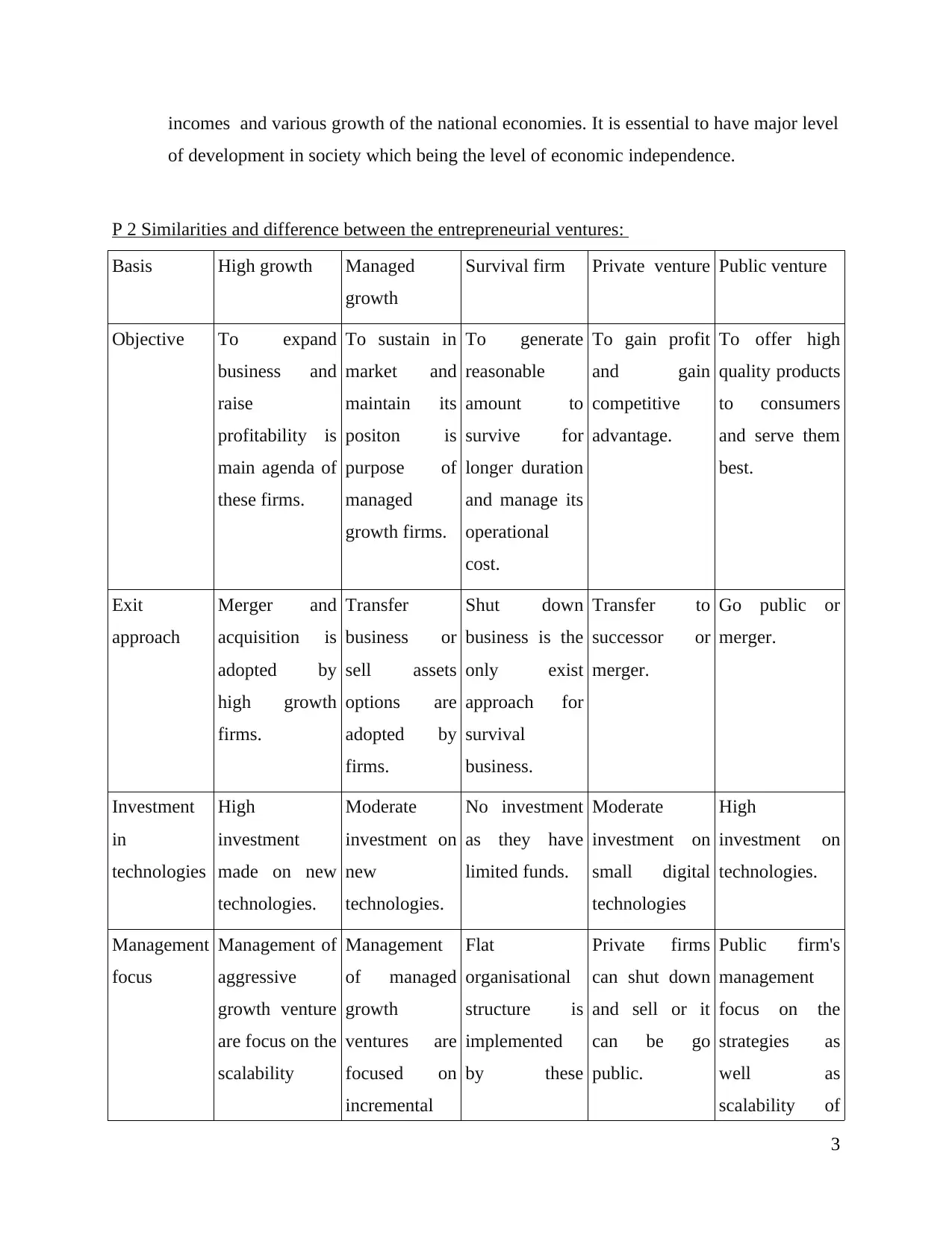
incomes and various growth of the national economies. It is essential to have major level
of development in society which being the level of economic independence.
P 2 Similarities and difference between the entrepreneurial ventures:
Basis High growth Managed
growth
Survival firm Private venture Public venture
Objective To expand
business and
raise
profitability is
main agenda of
these firms.
To sustain in
market and
maintain its
positon is
purpose of
managed
growth firms.
To generate
reasonable
amount to
survive for
longer duration
and manage its
operational
cost.
To gain profit
and gain
competitive
advantage.
To offer high
quality products
to consumers
and serve them
best.
Exit
approach
Merger and
acquisition is
adopted by
high growth
firms.
Transfer
business or
sell assets
options are
adopted by
firms.
Shut down
business is the
only exist
approach for
survival
business.
Transfer to
successor or
merger.
Go public or
merger.
Investment
in
technologies
High
investment
made on new
technologies.
Moderate
investment on
new
technologies.
No investment
as they have
limited funds.
Moderate
investment on
small digital
technologies
High
investment on
technologies.
Management
focus
Management of
aggressive
growth venture
are focus on the
scalability
Management
of managed
growth
ventures are
focused on
incremental
Flat
organisational
structure is
implemented
by these
Private firms
can shut down
and sell or it
can be go
public.
Public firm's
management
focus on the
strategies as
well as
scalability of
3
of development in society which being the level of economic independence.
P 2 Similarities and difference between the entrepreneurial ventures:
Basis High growth Managed
growth
Survival firm Private venture Public venture
Objective To expand
business and
raise
profitability is
main agenda of
these firms.
To sustain in
market and
maintain its
positon is
purpose of
managed
growth firms.
To generate
reasonable
amount to
survive for
longer duration
and manage its
operational
cost.
To gain profit
and gain
competitive
advantage.
To offer high
quality products
to consumers
and serve them
best.
Exit
approach
Merger and
acquisition is
adopted by
high growth
firms.
Transfer
business or
sell assets
options are
adopted by
firms.
Shut down
business is the
only exist
approach for
survival
business.
Transfer to
successor or
merger.
Go public or
merger.
Investment
in
technologies
High
investment
made on new
technologies.
Moderate
investment on
new
technologies.
No investment
as they have
limited funds.
Moderate
investment on
small digital
technologies
High
investment on
technologies.
Management
focus
Management of
aggressive
growth venture
are focus on the
scalability
Management
of managed
growth
ventures are
focused on
incremental
Flat
organisational
structure is
implemented
by these
Private firms
can shut down
and sell or it
can be go
public.
Public firm's
management
focus on the
strategies as
well as
scalability of
3
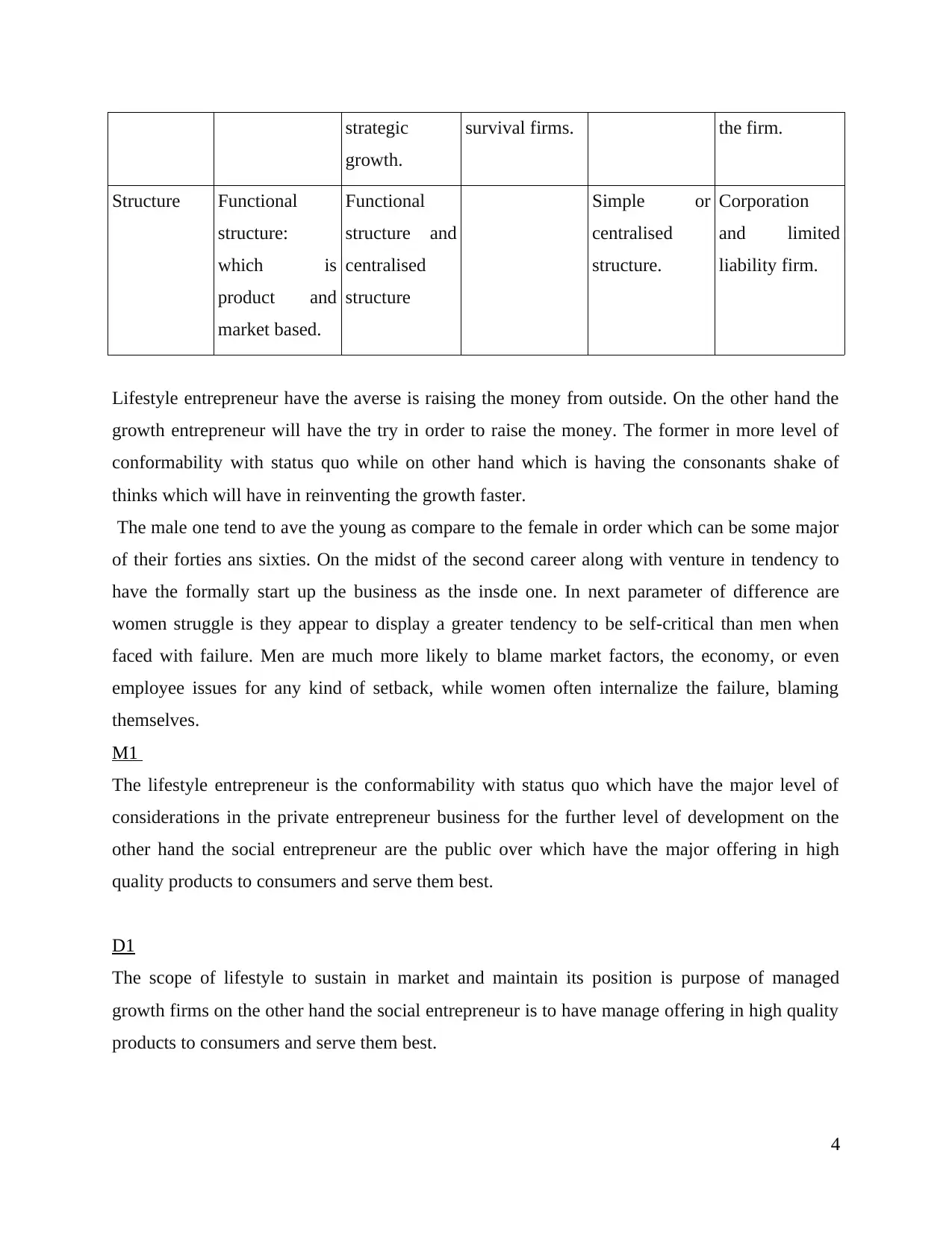
strategic
growth.
survival firms. the firm.
Structure Functional
structure:
which is
product and
market based.
Functional
structure and
centralised
structure
Simple or
centralised
structure.
Corporation
and limited
liability firm.
Lifestyle entrepreneur have the averse is raising the money from outside. On the other hand the
growth entrepreneur will have the try in order to raise the money. The former in more level of
conformability with status quo while on other hand which is having the consonants shake of
thinks which will have in reinventing the growth faster.
The male one tend to ave the young as compare to the female in order which can be some major
of their forties ans sixties. On the midst of the second career along with venture in tendency to
have the formally start up the business as the insde one. In next parameter of difference are
women struggle is they appear to display a greater tendency to be self-critical than men when
faced with failure. Men are much more likely to blame market factors, the economy, or even
employee issues for any kind of setback, while women often internalize the failure, blaming
themselves.
M1
The lifestyle entrepreneur is the conformability with status quo which have the major level of
considerations in the private entrepreneur business for the further level of development on the
other hand the social entrepreneur are the public over which have the major offering in high
quality products to consumers and serve them best.
D1
The scope of lifestyle to sustain in market and maintain its position is purpose of managed
growth firms on the other hand the social entrepreneur is to have manage offering in high quality
products to consumers and serve them best.
4
growth.
survival firms. the firm.
Structure Functional
structure:
which is
product and
market based.
Functional
structure and
centralised
structure
Simple or
centralised
structure.
Corporation
and limited
liability firm.
Lifestyle entrepreneur have the averse is raising the money from outside. On the other hand the
growth entrepreneur will have the try in order to raise the money. The former in more level of
conformability with status quo while on other hand which is having the consonants shake of
thinks which will have in reinventing the growth faster.
The male one tend to ave the young as compare to the female in order which can be some major
of their forties ans sixties. On the midst of the second career along with venture in tendency to
have the formally start up the business as the insde one. In next parameter of difference are
women struggle is they appear to display a greater tendency to be self-critical than men when
faced with failure. Men are much more likely to blame market factors, the economy, or even
employee issues for any kind of setback, while women often internalize the failure, blaming
themselves.
M1
The lifestyle entrepreneur is the conformability with status quo which have the major level of
considerations in the private entrepreneur business for the further level of development on the
other hand the social entrepreneur are the public over which have the major offering in high
quality products to consumers and serve them best.
D1
The scope of lifestyle to sustain in market and maintain its position is purpose of managed
growth firms on the other hand the social entrepreneur is to have manage offering in high quality
products to consumers and serve them best.
4
⊘ This is a preview!⊘
Do you want full access?
Subscribe today to unlock all pages.

Trusted by 1+ million students worldwide
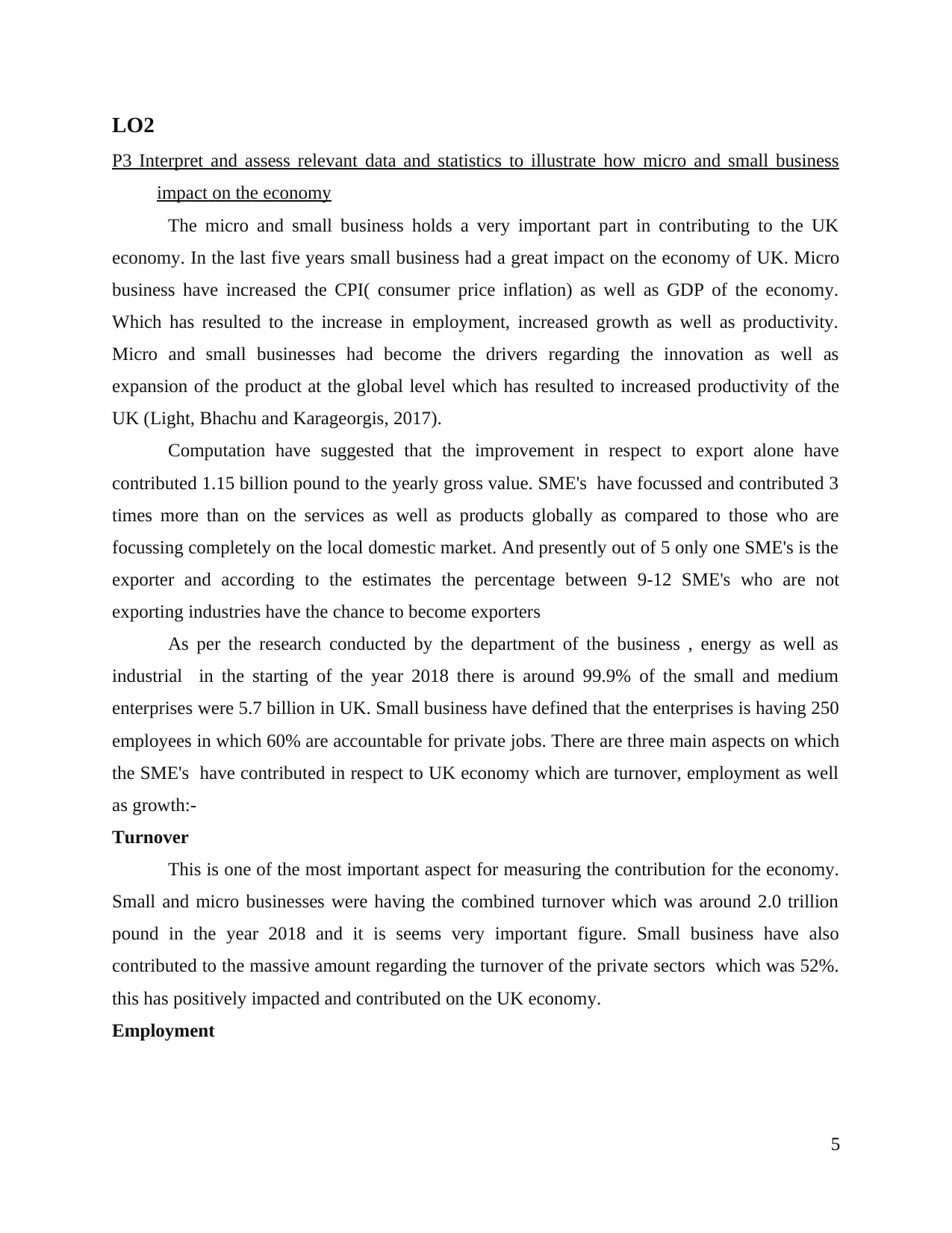
LO2
P3 Interpret and assess relevant data and statistics to illustrate how micro and small business
impact on the economy
The micro and small business holds a very important part in contributing to the UK
economy. In the last five years small business had a great impact on the economy of UK. Micro
business have increased the CPI( consumer price inflation) as well as GDP of the economy.
Which has resulted to the increase in employment, increased growth as well as productivity.
Micro and small businesses had become the drivers regarding the innovation as well as
expansion of the product at the global level which has resulted to increased productivity of the
UK (Light, Bhachu and Karageorgis, 2017).
Computation have suggested that the improvement in respect to export alone have
contributed 1.15 billion pound to the yearly gross value. SME's have focussed and contributed 3
times more than on the services as well as products globally as compared to those who are
focussing completely on the local domestic market. And presently out of 5 only one SME's is the
exporter and according to the estimates the percentage between 9-12 SME's who are not
exporting industries have the chance to become exporters
As per the research conducted by the department of the business , energy as well as
industrial in the starting of the year 2018 there is around 99.9% of the small and medium
enterprises were 5.7 billion in UK. Small business have defined that the enterprises is having 250
employees in which 60% are accountable for private jobs. There are three main aspects on which
the SME's have contributed in respect to UK economy which are turnover, employment as well
as growth:-
Turnover
This is one of the most important aspect for measuring the contribution for the economy.
Small and micro businesses were having the combined turnover which was around 2.0 trillion
pound in the year 2018 and it is seems very important figure. Small business have also
contributed to the massive amount regarding the turnover of the private sectors which was 52%.
this has positively impacted and contributed on the UK economy.
Employment
5
P3 Interpret and assess relevant data and statistics to illustrate how micro and small business
impact on the economy
The micro and small business holds a very important part in contributing to the UK
economy. In the last five years small business had a great impact on the economy of UK. Micro
business have increased the CPI( consumer price inflation) as well as GDP of the economy.
Which has resulted to the increase in employment, increased growth as well as productivity.
Micro and small businesses had become the drivers regarding the innovation as well as
expansion of the product at the global level which has resulted to increased productivity of the
UK (Light, Bhachu and Karageorgis, 2017).
Computation have suggested that the improvement in respect to export alone have
contributed 1.15 billion pound to the yearly gross value. SME's have focussed and contributed 3
times more than on the services as well as products globally as compared to those who are
focussing completely on the local domestic market. And presently out of 5 only one SME's is the
exporter and according to the estimates the percentage between 9-12 SME's who are not
exporting industries have the chance to become exporters
As per the research conducted by the department of the business , energy as well as
industrial in the starting of the year 2018 there is around 99.9% of the small and medium
enterprises were 5.7 billion in UK. Small business have defined that the enterprises is having 250
employees in which 60% are accountable for private jobs. There are three main aspects on which
the SME's have contributed in respect to UK economy which are turnover, employment as well
as growth:-
Turnover
This is one of the most important aspect for measuring the contribution for the economy.
Small and micro businesses were having the combined turnover which was around 2.0 trillion
pound in the year 2018 and it is seems very important figure. Small business have also
contributed to the massive amount regarding the turnover of the private sectors which was 52%.
this has positively impacted and contributed on the UK economy.
Employment
5
Paraphrase This Document
Need a fresh take? Get an instant paraphrase of this document with our AI Paraphraser
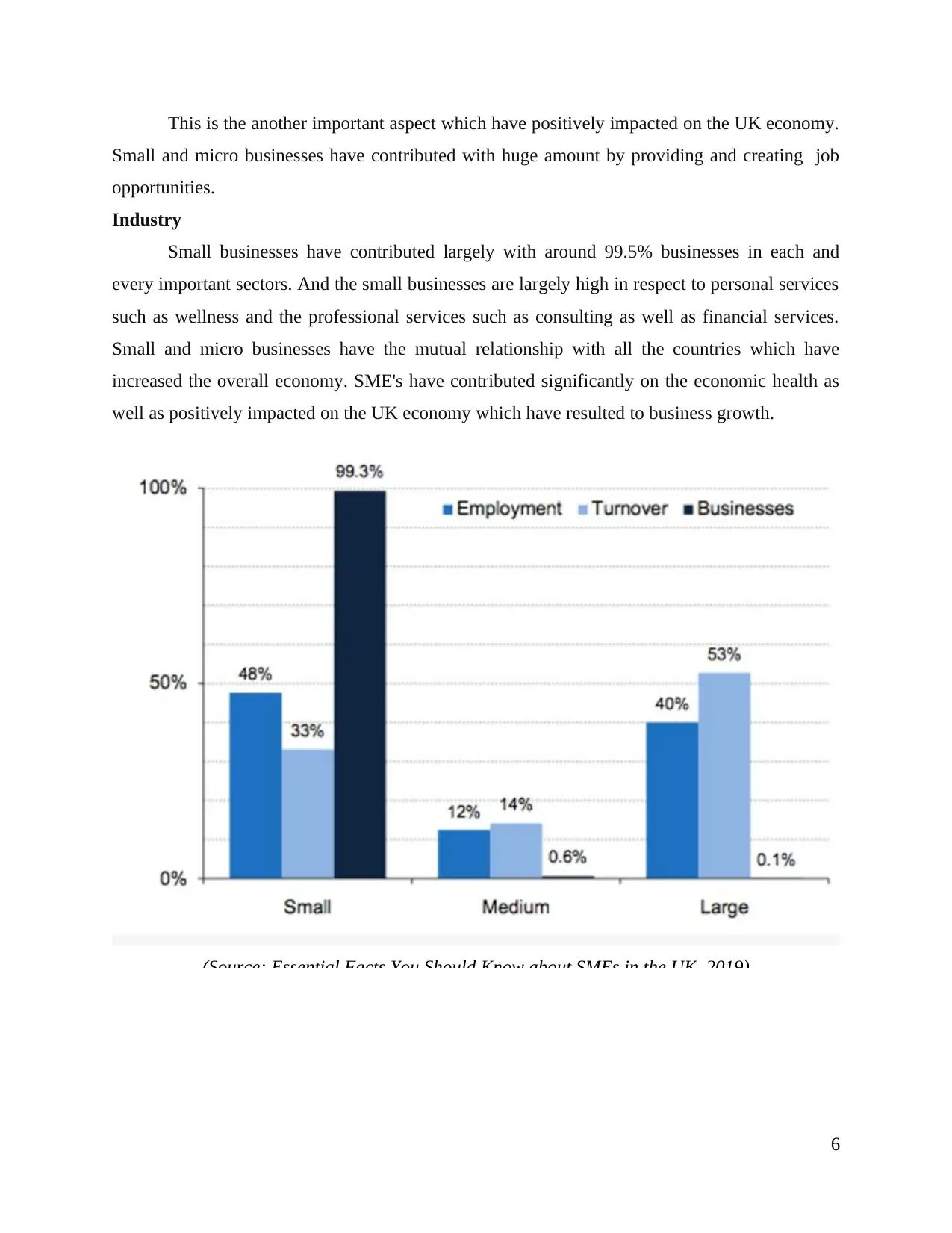
This is the another important aspect which have positively impacted on the UK economy.
Small and micro businesses have contributed with huge amount by providing and creating job
opportunities.
Industry
Small businesses have contributed largely with around 99.5% businesses in each and
every important sectors. And the small businesses are largely high in respect to personal services
such as wellness and the professional services such as consulting as well as financial services.
Small and micro businesses have the mutual relationship with all the countries which have
increased the overall economy. SME's have contributed significantly on the economic health as
well as positively impacted on the UK economy which have resulted to business growth.
(Source: Essential Facts You Should Know about SMEs in the UK, 2019)
6
Small and micro businesses have contributed with huge amount by providing and creating job
opportunities.
Industry
Small businesses have contributed largely with around 99.5% businesses in each and
every important sectors. And the small businesses are largely high in respect to personal services
such as wellness and the professional services such as consulting as well as financial services.
Small and micro businesses have the mutual relationship with all the countries which have
increased the overall economy. SME's have contributed significantly on the economic health as
well as positively impacted on the UK economy which have resulted to business growth.
(Source: Essential Facts You Should Know about SMEs in the UK, 2019)
6
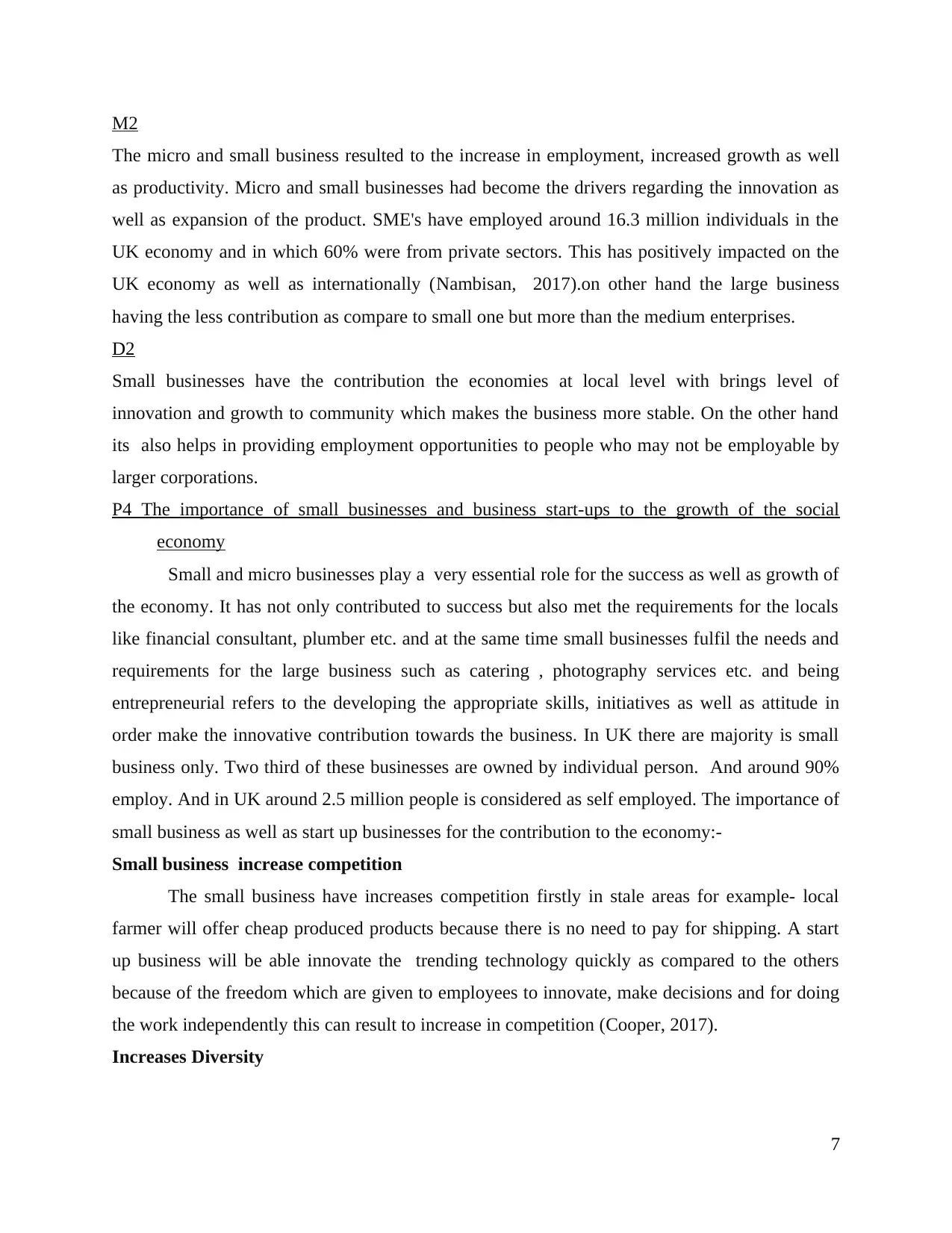
M2
The micro and small business resulted to the increase in employment, increased growth as well
as productivity. Micro and small businesses had become the drivers regarding the innovation as
well as expansion of the product. SME's have employed around 16.3 million individuals in the
UK economy and in which 60% were from private sectors. This has positively impacted on the
UK economy as well as internationally (Nambisan, 2017).on other hand the large business
having the less contribution as compare to small one but more than the medium enterprises.
D2
Small businesses have the contribution the economies at local level with brings level of
innovation and growth to community which makes the business more stable. On the other hand
its also helps in providing employment opportunities to people who may not be employable by
larger corporations.
P4 The importance of small businesses and business start-ups to the growth of the social
economy
Small and micro businesses play a very essential role for the success as well as growth of
the economy. It has not only contributed to success but also met the requirements for the locals
like financial consultant, plumber etc. and at the same time small businesses fulfil the needs and
requirements for the large business such as catering , photography services etc. and being
entrepreneurial refers to the developing the appropriate skills, initiatives as well as attitude in
order make the innovative contribution towards the business. In UK there are majority is small
business only. Two third of these businesses are owned by individual person. And around 90%
employ. And in UK around 2.5 million people is considered as self employed. The importance of
small business as well as start up businesses for the contribution to the economy:-
Small business increase competition
The small business have increases competition firstly in stale areas for example- local
farmer will offer cheap produced products because there is no need to pay for shipping. A start
up business will be able innovate the trending technology quickly as compared to the others
because of the freedom which are given to employees to innovate, make decisions and for doing
the work independently this can result to increase in competition (Cooper, 2017).
Increases Diversity
7
The micro and small business resulted to the increase in employment, increased growth as well
as productivity. Micro and small businesses had become the drivers regarding the innovation as
well as expansion of the product. SME's have employed around 16.3 million individuals in the
UK economy and in which 60% were from private sectors. This has positively impacted on the
UK economy as well as internationally (Nambisan, 2017).on other hand the large business
having the less contribution as compare to small one but more than the medium enterprises.
D2
Small businesses have the contribution the economies at local level with brings level of
innovation and growth to community which makes the business more stable. On the other hand
its also helps in providing employment opportunities to people who may not be employable by
larger corporations.
P4 The importance of small businesses and business start-ups to the growth of the social
economy
Small and micro businesses play a very essential role for the success as well as growth of
the economy. It has not only contributed to success but also met the requirements for the locals
like financial consultant, plumber etc. and at the same time small businesses fulfil the needs and
requirements for the large business such as catering , photography services etc. and being
entrepreneurial refers to the developing the appropriate skills, initiatives as well as attitude in
order make the innovative contribution towards the business. In UK there are majority is small
business only. Two third of these businesses are owned by individual person. And around 90%
employ. And in UK around 2.5 million people is considered as self employed. The importance of
small business as well as start up businesses for the contribution to the economy:-
Small business increase competition
The small business have increases competition firstly in stale areas for example- local
farmer will offer cheap produced products because there is no need to pay for shipping. A start
up business will be able innovate the trending technology quickly as compared to the others
because of the freedom which are given to employees to innovate, make decisions and for doing
the work independently this can result to increase in competition (Cooper, 2017).
Increases Diversity
7
⊘ This is a preview!⊘
Do you want full access?
Subscribe today to unlock all pages.

Trusted by 1+ million students worldwide
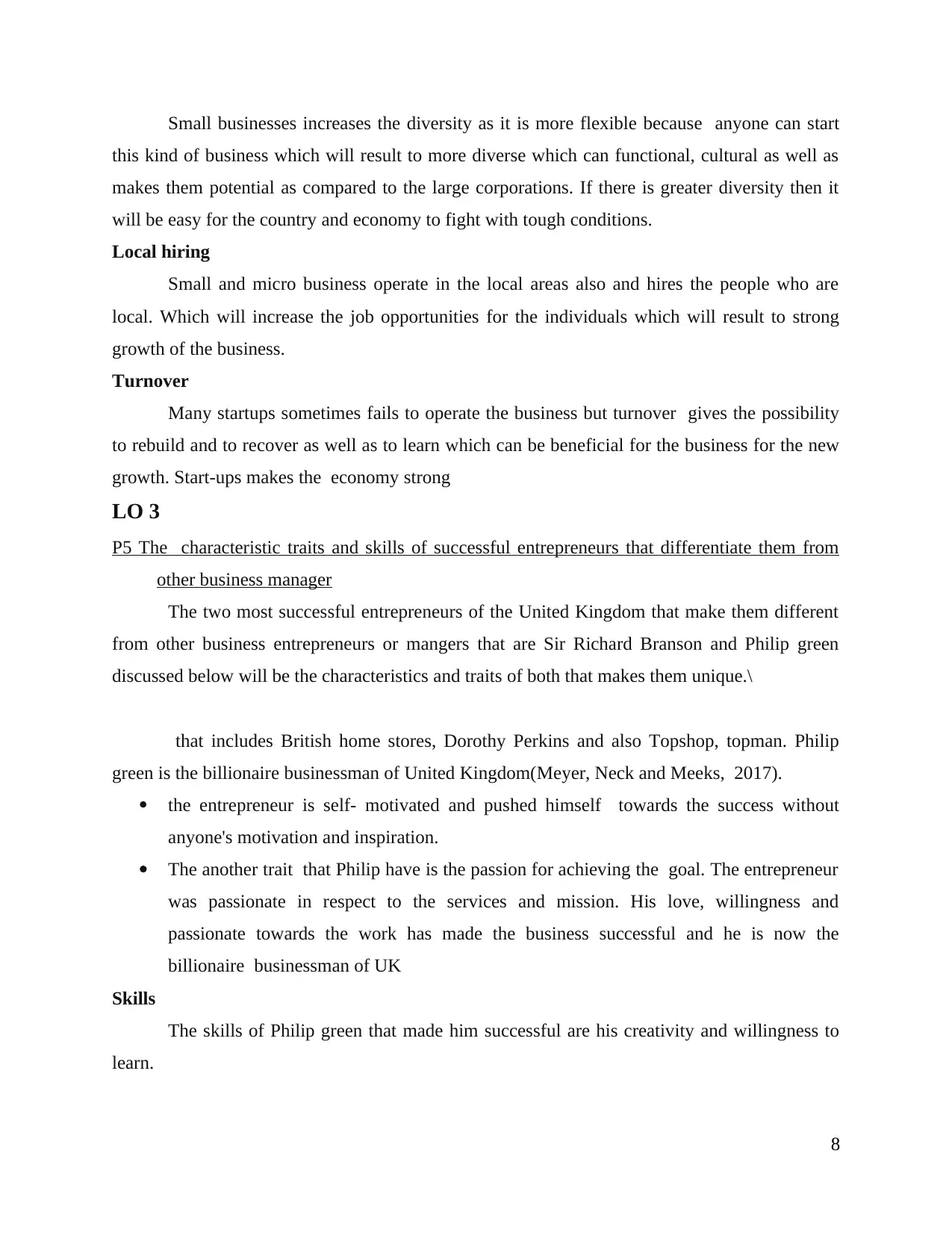
Small businesses increases the diversity as it is more flexible because anyone can start
this kind of business which will result to more diverse which can functional, cultural as well as
makes them potential as compared to the large corporations. If there is greater diversity then it
will be easy for the country and economy to fight with tough conditions.
Local hiring
Small and micro business operate in the local areas also and hires the people who are
local. Which will increase the job opportunities for the individuals which will result to strong
growth of the business.
Turnover
Many startups sometimes fails to operate the business but turnover gives the possibility
to rebuild and to recover as well as to learn which can be beneficial for the business for the new
growth. Start-ups makes the economy strong
LO 3
P5 The characteristic traits and skills of successful entrepreneurs that differentiate them from
other business manager
The two most successful entrepreneurs of the United Kingdom that make them different
from other business entrepreneurs or mangers that are Sir Richard Branson and Philip green
discussed below will be the characteristics and traits of both that makes them unique.\
that includes British home stores, Dorothy Perkins and also Topshop, topman. Philip
green is the billionaire businessman of United Kingdom(Meyer, Neck and Meeks, 2017).
the entrepreneur is self- motivated and pushed himself towards the success without
anyone's motivation and inspiration.
The another trait that Philip have is the passion for achieving the goal. The entrepreneur
was passionate in respect to the services and mission. His love, willingness and
passionate towards the work has made the business successful and he is now the
billionaire businessman of UK
Skills
The skills of Philip green that made him successful are his creativity and willingness to
learn.
8
this kind of business which will result to more diverse which can functional, cultural as well as
makes them potential as compared to the large corporations. If there is greater diversity then it
will be easy for the country and economy to fight with tough conditions.
Local hiring
Small and micro business operate in the local areas also and hires the people who are
local. Which will increase the job opportunities for the individuals which will result to strong
growth of the business.
Turnover
Many startups sometimes fails to operate the business but turnover gives the possibility
to rebuild and to recover as well as to learn which can be beneficial for the business for the new
growth. Start-ups makes the economy strong
LO 3
P5 The characteristic traits and skills of successful entrepreneurs that differentiate them from
other business manager
The two most successful entrepreneurs of the United Kingdom that make them different
from other business entrepreneurs or mangers that are Sir Richard Branson and Philip green
discussed below will be the characteristics and traits of both that makes them unique.\
that includes British home stores, Dorothy Perkins and also Topshop, topman. Philip
green is the billionaire businessman of United Kingdom(Meyer, Neck and Meeks, 2017).
the entrepreneur is self- motivated and pushed himself towards the success without
anyone's motivation and inspiration.
The another trait that Philip have is the passion for achieving the goal. The entrepreneur
was passionate in respect to the services and mission. His love, willingness and
passionate towards the work has made the business successful and he is now the
billionaire businessman of UK
Skills
The skills of Philip green that made him successful are his creativity and willingness to
learn.
8
Paraphrase This Document
Need a fresh take? Get an instant paraphrase of this document with our AI Paraphraser
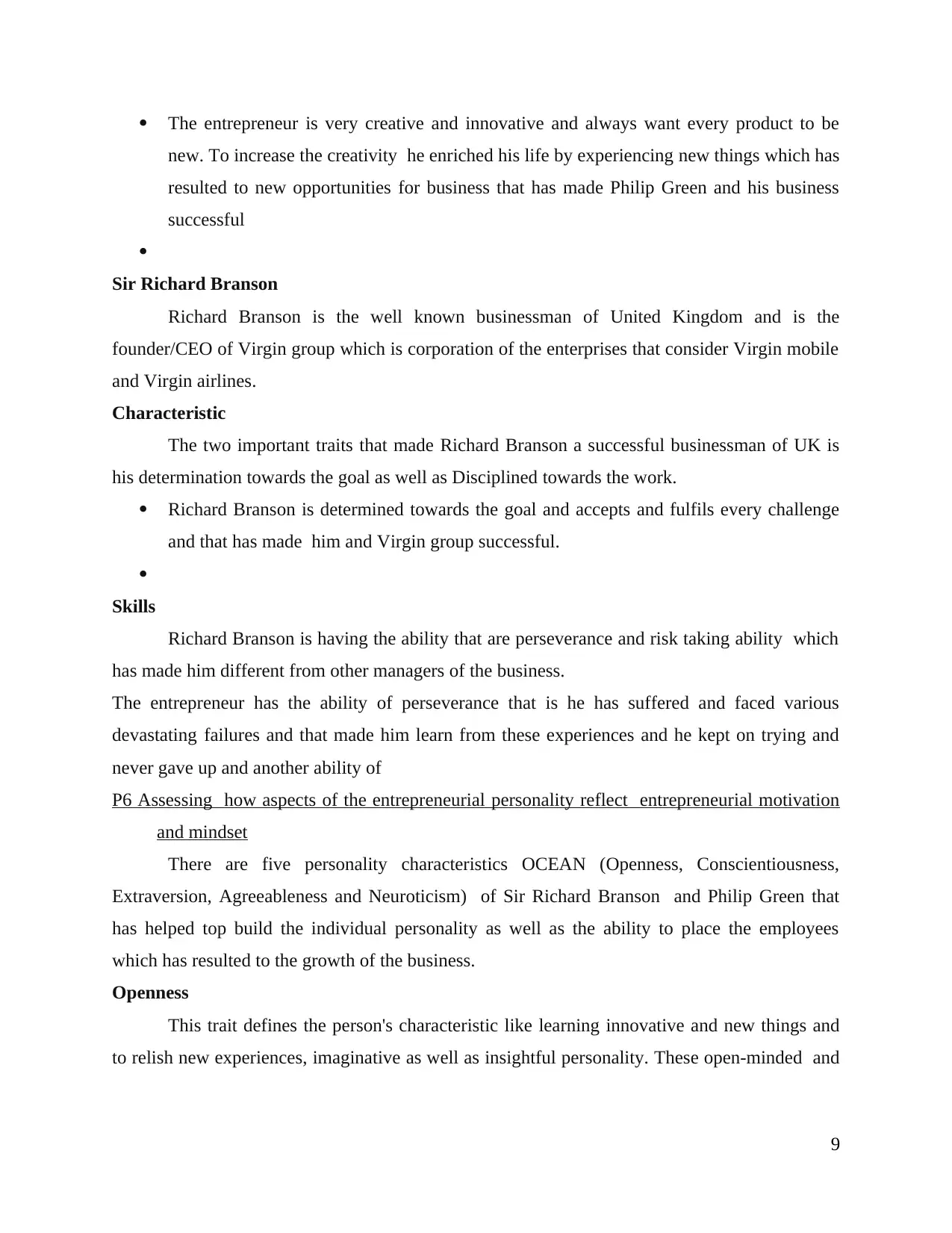
The entrepreneur is very creative and innovative and always want every product to be
new. To increase the creativity he enriched his life by experiencing new things which has
resulted to new opportunities for business that has made Philip Green and his business
successful
Sir Richard Branson
Richard Branson is the well known businessman of United Kingdom and is the
founder/CEO of Virgin group which is corporation of the enterprises that consider Virgin mobile
and Virgin airlines.
Characteristic
The two important traits that made Richard Branson a successful businessman of UK is
his determination towards the goal as well as Disciplined towards the work.
Richard Branson is determined towards the goal and accepts and fulfils every challenge
and that has made him and Virgin group successful.
Skills
Richard Branson is having the ability that are perseverance and risk taking ability which
has made him different from other managers of the business.
The entrepreneur has the ability of perseverance that is he has suffered and faced various
devastating failures and that made him learn from these experiences and he kept on trying and
never gave up and another ability of
P6 Assessing how aspects of the entrepreneurial personality reflect entrepreneurial motivation
and mindset
There are five personality characteristics OCEAN (Openness, Conscientiousness,
Extraversion, Agreeableness and Neuroticism) of Sir Richard Branson and Philip Green that
has helped top build the individual personality as well as the ability to place the employees
which has resulted to the growth of the business.
Openness
This trait defines the person's characteristic like learning innovative and new things and
to relish new experiences, imaginative as well as insightful personality. These open-minded and
9
new. To increase the creativity he enriched his life by experiencing new things which has
resulted to new opportunities for business that has made Philip Green and his business
successful
Sir Richard Branson
Richard Branson is the well known businessman of United Kingdom and is the
founder/CEO of Virgin group which is corporation of the enterprises that consider Virgin mobile
and Virgin airlines.
Characteristic
The two important traits that made Richard Branson a successful businessman of UK is
his determination towards the goal as well as Disciplined towards the work.
Richard Branson is determined towards the goal and accepts and fulfils every challenge
and that has made him and Virgin group successful.
Skills
Richard Branson is having the ability that are perseverance and risk taking ability which
has made him different from other managers of the business.
The entrepreneur has the ability of perseverance that is he has suffered and faced various
devastating failures and that made him learn from these experiences and he kept on trying and
never gave up and another ability of
P6 Assessing how aspects of the entrepreneurial personality reflect entrepreneurial motivation
and mindset
There are five personality characteristics OCEAN (Openness, Conscientiousness,
Extraversion, Agreeableness and Neuroticism) of Sir Richard Branson and Philip Green that
has helped top build the individual personality as well as the ability to place the employees
which has resulted to the growth of the business.
Openness
This trait defines the person's characteristic like learning innovative and new things and
to relish new experiences, imaginative as well as insightful personality. These open-minded and
9
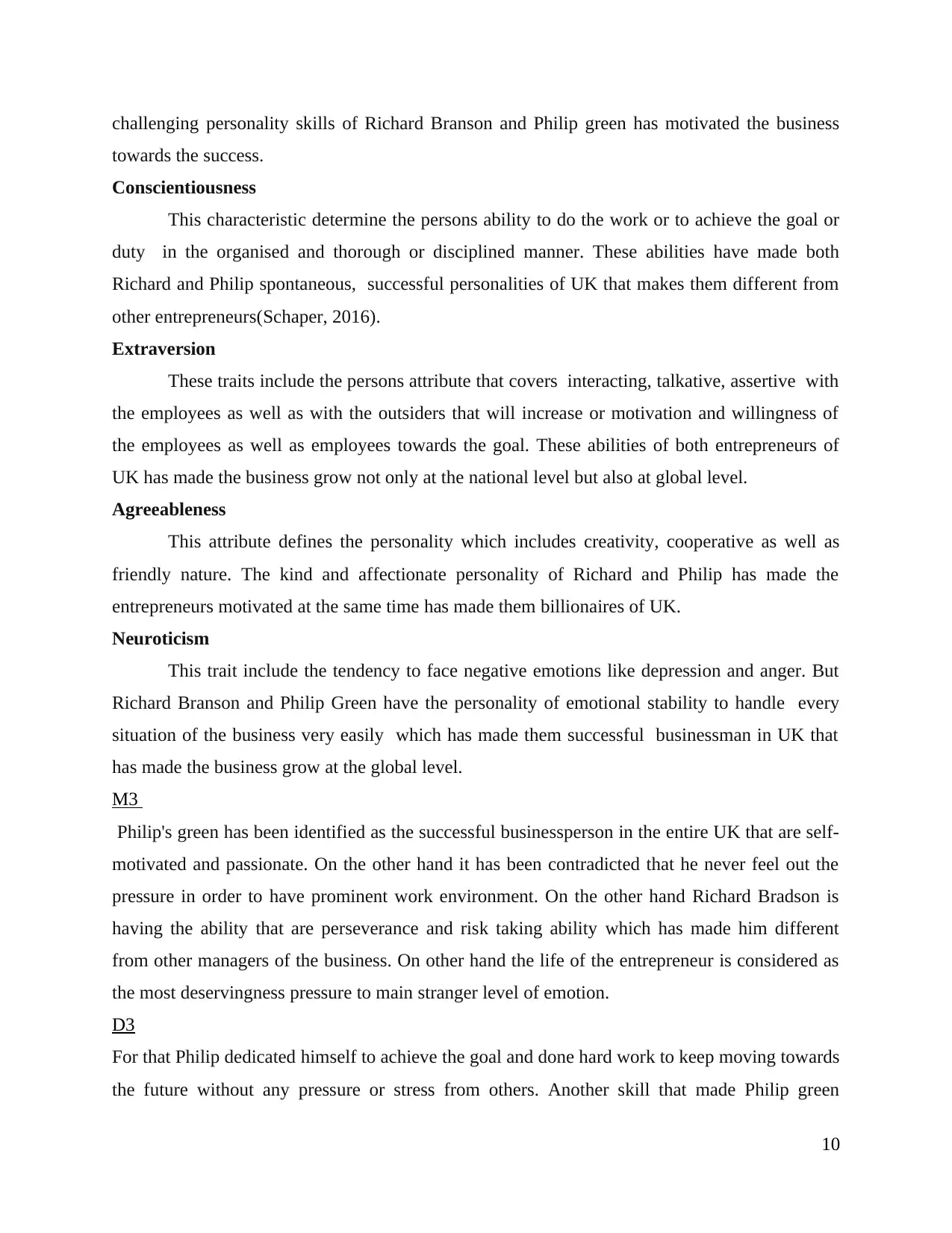
challenging personality skills of Richard Branson and Philip green has motivated the business
towards the success.
Conscientiousness
This characteristic determine the persons ability to do the work or to achieve the goal or
duty in the organised and thorough or disciplined manner. These abilities have made both
Richard and Philip spontaneous, successful personalities of UK that makes them different from
other entrepreneurs(Schaper, 2016).
Extraversion
These traits include the persons attribute that covers interacting, talkative, assertive with
the employees as well as with the outsiders that will increase or motivation and willingness of
the employees as well as employees towards the goal. These abilities of both entrepreneurs of
UK has made the business grow not only at the national level but also at global level.
Agreeableness
This attribute defines the personality which includes creativity, cooperative as well as
friendly nature. The kind and affectionate personality of Richard and Philip has made the
entrepreneurs motivated at the same time has made them billionaires of UK.
Neuroticism
This trait include the tendency to face negative emotions like depression and anger. But
Richard Branson and Philip Green have the personality of emotional stability to handle every
situation of the business very easily which has made them successful businessman in UK that
has made the business grow at the global level.
M3
Philip's green has been identified as the successful businessperson in the entire UK that are self-
motivated and passionate. On the other hand it has been contradicted that he never feel out the
pressure in order to have prominent work environment. On the other hand Richard Bradson is
having the ability that are perseverance and risk taking ability which has made him different
from other managers of the business. On other hand the life of the entrepreneur is considered as
the most deservingness pressure to main stranger level of emotion.
D3
For that Philip dedicated himself to achieve the goal and done hard work to keep moving towards
the future without any pressure or stress from others. Another skill that made Philip green
10
towards the success.
Conscientiousness
This characteristic determine the persons ability to do the work or to achieve the goal or
duty in the organised and thorough or disciplined manner. These abilities have made both
Richard and Philip spontaneous, successful personalities of UK that makes them different from
other entrepreneurs(Schaper, 2016).
Extraversion
These traits include the persons attribute that covers interacting, talkative, assertive with
the employees as well as with the outsiders that will increase or motivation and willingness of
the employees as well as employees towards the goal. These abilities of both entrepreneurs of
UK has made the business grow not only at the national level but also at global level.
Agreeableness
This attribute defines the personality which includes creativity, cooperative as well as
friendly nature. The kind and affectionate personality of Richard and Philip has made the
entrepreneurs motivated at the same time has made them billionaires of UK.
Neuroticism
This trait include the tendency to face negative emotions like depression and anger. But
Richard Branson and Philip Green have the personality of emotional stability to handle every
situation of the business very easily which has made them successful businessman in UK that
has made the business grow at the global level.
M3
Philip's green has been identified as the successful businessperson in the entire UK that are self-
motivated and passionate. On the other hand it has been contradicted that he never feel out the
pressure in order to have prominent work environment. On the other hand Richard Bradson is
having the ability that are perseverance and risk taking ability which has made him different
from other managers of the business. On other hand the life of the entrepreneur is considered as
the most deservingness pressure to main stranger level of emotion.
D3
For that Philip dedicated himself to achieve the goal and done hard work to keep moving towards
the future without any pressure or stress from others. Another skill that made Philip green
10
⊘ This is a preview!⊘
Do you want full access?
Subscribe today to unlock all pages.

Trusted by 1+ million students worldwide
1 out of 16
Related Documents
Your All-in-One AI-Powered Toolkit for Academic Success.
+13062052269
info@desklib.com
Available 24*7 on WhatsApp / Email
![[object Object]](/_next/static/media/star-bottom.7253800d.svg)
Unlock your academic potential
Copyright © 2020–2026 A2Z Services. All Rights Reserved. Developed and managed by ZUCOL.





